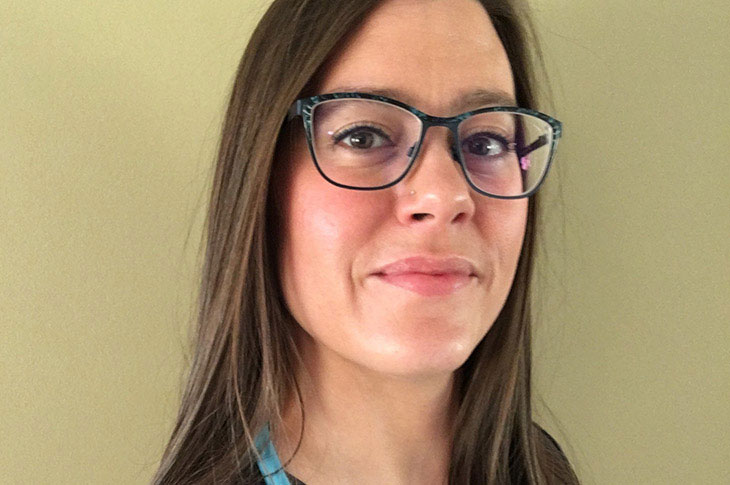SAIT student juggles multiple jobs on the COVID-19 front line

To say Annalise Woertman’s life has been disrupted by the COVID-19 pandemic is an understatement. Her health care jobs (more than one) and her SAIT studies have all become intertwined with the coronavirus and its impact on our community.
As well as being a full-time, second-year student in SAIT’s Respiratory Therapy (RT) program, Woertman is a health administration instructor at Bow Valley College. She also works in the intensive care unit (ICU) at Calgary’s Foothills Medical Centre as a unit clerk, responsible for creating schedules and moving patients.
Information over fear
Recently, one of Woertman’s skills — she is a specialist in fitting N95 respirators (masks) — became even more critical. Despite her already busy schedule, Woertman still continues to work as an N95 Fit Testing Designate at Foothills.
“The importance of face masks is not unique to this pandemic,” says Woertman. “It has always been important, to anyone with an airborne illness. But because of COVID-19, doctors, nurses and RT’s need to make extra sure their masks fit properly.”
As a front-line worker in ICU, Woertman says she is not frightened by the virus and is ready to help if need be. She says it’s important for people to understand how it spreads. She recommends that people seek out accurate information about COVID-19 from credible sources, and to take the proper precautions. Meanwhile, Woertman says “everyone has been asking a lot of questions. We don't have all the answers yet, but we need to be patient because the answers will eventually come.”
The shift to remote learning
Today, Woertman’s highest priority is finishing her RT studies. That’s where she’s learning to assist patients with pulmonary and breathing issues, an increasingly vital role because of the serious respiratory problems that can be caused by COVID-19. RTs perform key responsibilities such as operating ventilators, and Woertman was inspired to study at SAIT after working alongside RTs in the ICU.
Like all students, Woertman’s classes were shifted to remote learning by computer once SAIT’s campus was closed in mid-March.
“It all happened quickly, over three days,” says Woertman. “I think our instructors did a great job under the circumstances. Everything has been well communicated. They tried to make the transition as smoothly as possible as we moved toward the last few weeks of the semester.
“I really miss seeing and working with my fellow students. I miss our work groups. Sure it has been a bit challenging and frustrating, but you just have to make the best of it.”
Hands-on education
Usually, the RT program includes a lot of hands-on practice in the simulation lab, where Woertman and her fellow students practice their skills on high-tech patient simulators. Woertman says it was fortunate for her class that the transition happened near the end of the year, because most of the hands-on lab work had already been covered.
However, there is one big ongoing concern: her third year — a hospital practicum — has been postponed. It was supposed to begin in June. Now, she says, it has been delayed because of the pandemic.
Meanwhile, Woertman’s experience working in a hospital and as a full-time SAIT student is contributing to her role as an instructor in the Bow Valley College Hospital Unit Clerk certificate program, where she’s also a graduate.
“I’ve gained such an interesting perspective because I’m instructing students on how to succeed while, at the same time, I’m a SAIT student who is also trying to succeed,” she says.
“I try hard to reach out and help them because I know exactly what they’re going through.”
Find out more about SAIT’s everyday heroes – the front-line alumni, instructors, employees and students using their skills to make a difference.
Skills for the Future
We prepare students for successful careers and lives.
SAIT'S
2020-2025
Strategic plan

Oki, Âba wathtech, Danit'ada, Tawnshi, Hello.
SAIT is located on the traditional territories of the Niitsitapi (Blackfoot) and the people of Treaty 7 which includes the Siksika, the Piikani, the Kainai, the Tsuut’ina and the Îyârhe Nakoda of Bearspaw, Chiniki and Goodstoney.
We are situated in an area the Blackfoot tribes traditionally called Moh’kinsstis, where the Bow River meets the Elbow River. We now call it the city of Calgary, which is also home to the Métis Nation of Alberta.